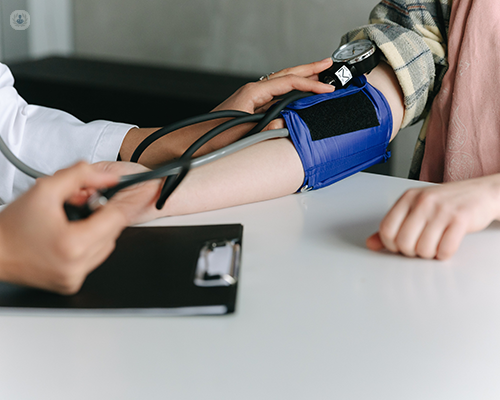Hypertension and your kidneys: How high blood pressure affects renal function
Written in association with:Hypertension (high blood pressure) is a major cause and consequence of kidney disease. Proper management of hypertension can protect both your heart and kidneys, preventing complications such as chronic kidney disease or kidney failure.
We spoke to Dr Richard Hull, leading consultant nephrologist, who provided an expert insight into the connection between hypertension and kidney health.

What is hypertension?
Blood pressure is the pressure in the main arteries that carry blood from the heart to the rest of the body. It is measured as the maximum and minimum blood pressure with each heartbeat. Blood pressure is measured in millimetres of mercury (mmHg) and is represented by two numbers: systolic pressure (the maximum pressure which is the top or first number) and diastolic pressure (the minimum pressure which is the bottom or second number).
Normal blood pressure varies a lot and can be lower at night and go up with exercise and other forms of stress (e.g. anxiety). It is typically around 120/80 mmHg. Hypertension is determined when blood pressure readings consistently exceed 140/90 mmHg and your average daytime ambulatory or home blood pressure is 135/85 mmHg or above. Hypertension is a condition where the force of blood pushing against the walls of the arteries is consistently too high. The higher your resting blood pressure, the higher your risk of heart disease, stroke and progressive kidney damage.
How does hypertension affect the kidneys?
The kidneys play a critical role in maintaining overall health by filtering waste and excess fluid from the bloodstream. To do this efficiently, the kidneys rely on healthy blood vessels. Healthy kidneys also help regulate blood pressure through controlling the amount of fluid in the circulation and by sending chemical messages (called hormones) that control constriction of blood vessels.
When blood pressure is consistently too high, we think it causes thickening and scarring of blood vessels that over time stop the kidneys functioning normally and, in some individuals, this can progress to chronic kidney disease or even kidney failure.
Additionally, as kidney function declines, the kidneys also become less efficient at regulating blood pressure, creating a dangerous cycle where both conditions worsen over time.
What are the symptoms of kidney damage caused by hypertension?
In the early stages, kidney damage from hypertension often shows no noticeable symptoms. However, as the damage progresses, symptoms may develop (but only when the disease is advanced) and this can indicate reduced kidney function.
Common symptoms of advanced kidney damage include:
- oedema (swelling) in the legs, ankles, feet, or face
- unusual fatigue or weakness
- shortness of breath
- nausea or vomiting
- loss of appetite and a metallic taste in the mouth
If you experience these symptoms and have hypertension, it’s important to consult with a specialist, such as a consultant nephrologist, to get a kidney health check.
What treatment options are available to control hypertension and protect the kidneys?
Managing hypertension is essential for protecting the kidneys and reducing cardiovascular risk. Early intervention and proper treatment can slow or prevent kidney damage, typically involving a combination of medications or lifestyle changes.
Medications
There are several classes of medications that can help manage hypertension and protect kidney function:
- ACE inhibitors and angiotensin II receptor blockers interact with a hormone system in the body and lower blood pressure by relaxing blood vessels, helping prevent additional kidney damage.
- Diuretics aid in removing excess fluid and sodium from the body, helping lower blood pressure.
- Calcium channel blockers relax the muscles in blood vessels, further reducing blood pressure, while beta-blockers lower heart rate and the force of heart contractions, thereby protecting the kidneys.
It’s important to work closely with your consultant nephrologist, as medication doses will need adjustment over time, and a combination of drugs may be necessary for effective blood pressure control.
Lifestyle changes
In addition to medication, certain lifestyle changes can significantly lower blood pressure and protect kidney health:
- Adopting a heart-healthy diet, which emphasises fruits, vegetables, whole grains, and lean proteins while reducing sodium and processed food intake, is beneficial.
- Regular physical activity, aiming for at least 150 minutes of moderate exercise per week, is also crucial.
- Losing excess weight, limiting alcohol consumption, quitting smoking, and managing stress through techniques such as meditation or deep breathing exercises can further aid in controlling hypertension and protecting kidney function.
How often should I check my kidney function if I have hypertension?
If you have hypertension, it’s essential to monitor your kidney function regularly to detect any early signs of damage with a kidney health check.
Kidney health check tests include:
- Blood tests: A serum creatinine test measures the level of creatinine in the blood, which is a key marker of kidney function. Elevated levels can indicate kidney damage.
- Glomerular filtration rate (GFR): This result is obtained from the creatinine test and estimates how well the kidneys are filtering blood. A GFR lower than 60 mL/min may indicate the presence of chronic kidney disease.
- Urine tests: Testing for protein in the urine can indicate kidney damage, as damaged kidneys allow protein to leak into the urine. This is done with a urine albumin creatinine ratio.
Your consultant nephrologist will recommend having your kidney function tested at least once a year. If you have additional risk factors such as diabetes or a family history of kidney disease, you will be advised more frequent testing, such as every 6 months.
If you would like to book an appointment with Dr Richard Hull, head on over to his Top Doctors profile today.


